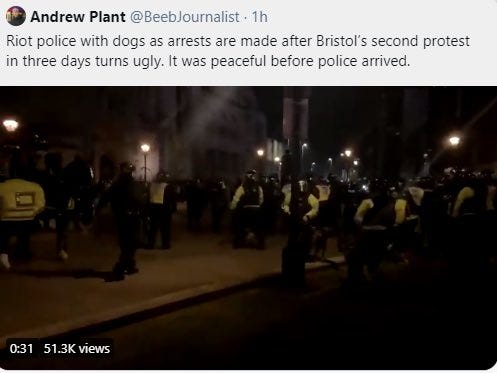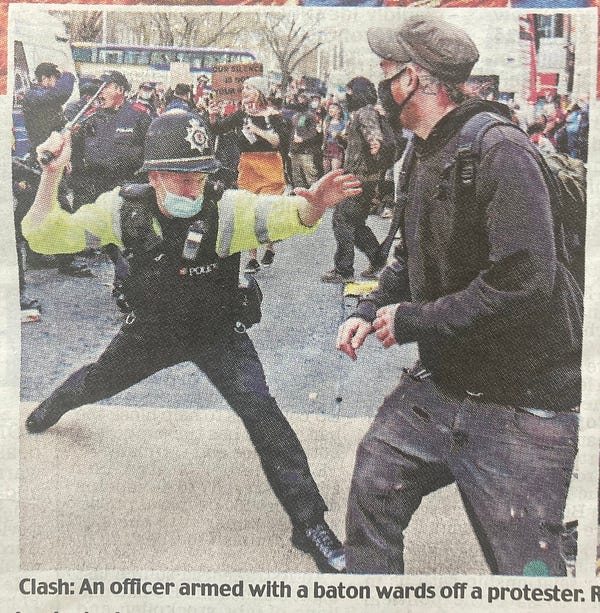The (heavily-edited) thin blue line: News stories about protests parrot the police's words
And if you're not a 'friendly' journalist, the law will decide you’re illegitimate.
Police violently cracked down on a protest in Bristol last night. Here’s how a journalist for the BBC local news programme Points West reported on it:

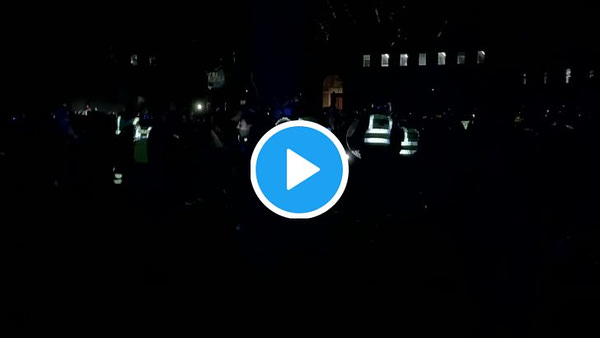
Actually, that was his second attempt. His first tweet was rather blunter, perhaps too blunt to comply with the BBC’s ‘who’s to say who’s bad?’ idea of impartiality and balance. It read:
Riot police with dogs as arrests are made after Bristol’s second protest in three days turns ugly. It was peaceful before police arrived.
The assertion that the protest was about “rent prices” was also inaccurate. Images from earlier in the evening clearly show signs that specifically refer to provisions in the Police, Crime, Sentencing and Courts Bill to target marginalised people, particularly Gypsy, Roma, and Traveller communities:

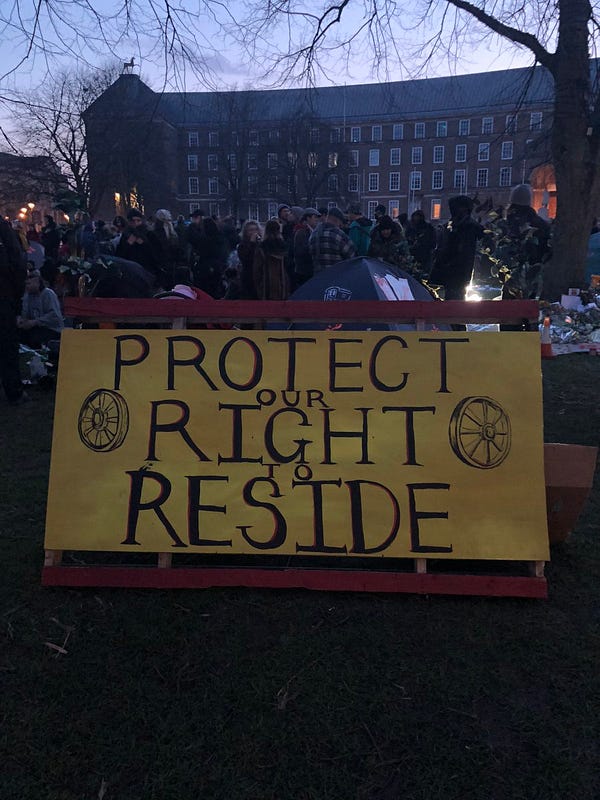
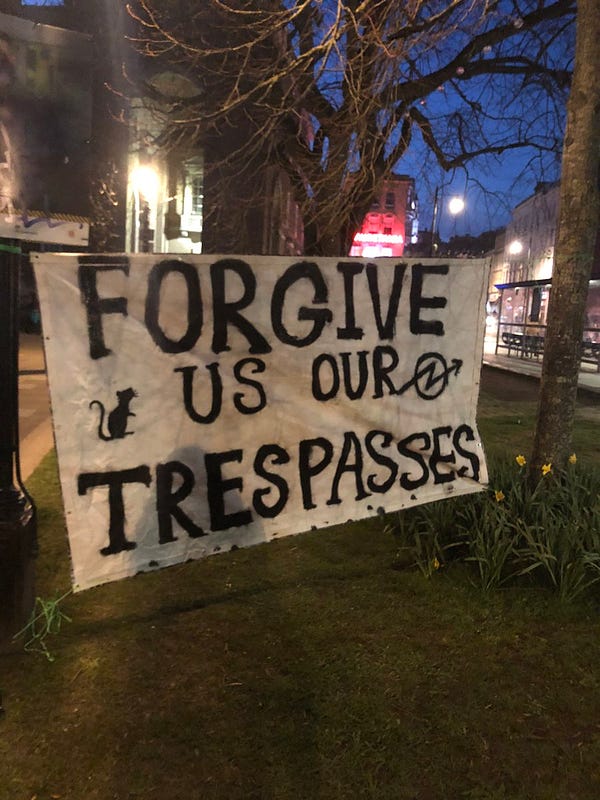
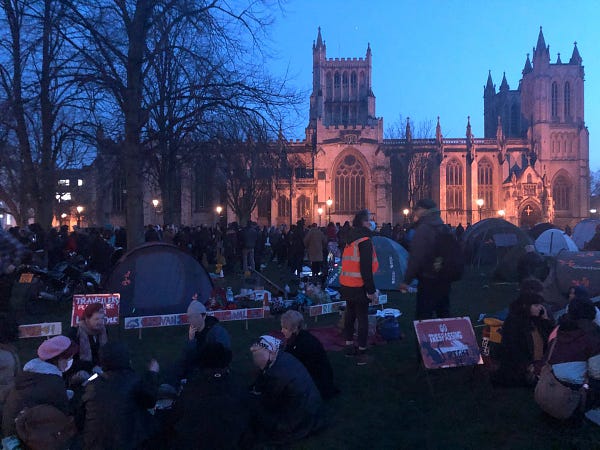
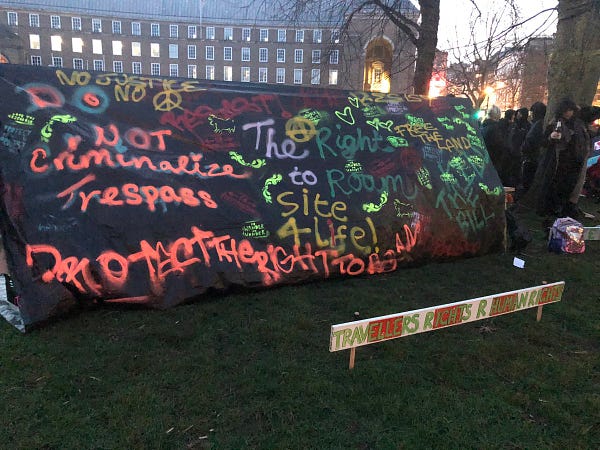
While the BBC News crew was left to cover the protest and the policing response seemingly unmolested — aside from that mysteriously disappearing tweet — journalists from the independent media cooperative, The Bristol Cable, were harassed by the police and threatened with “force and dogs” despite showing their NUJ-accredited press cards:

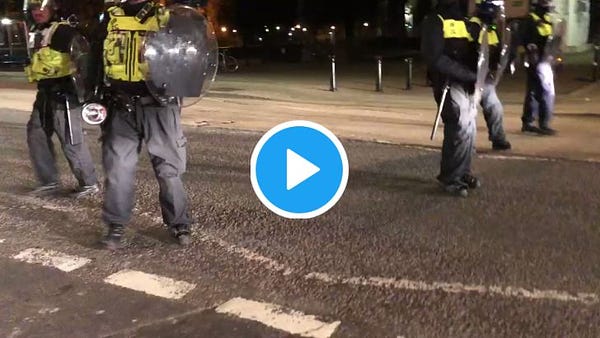

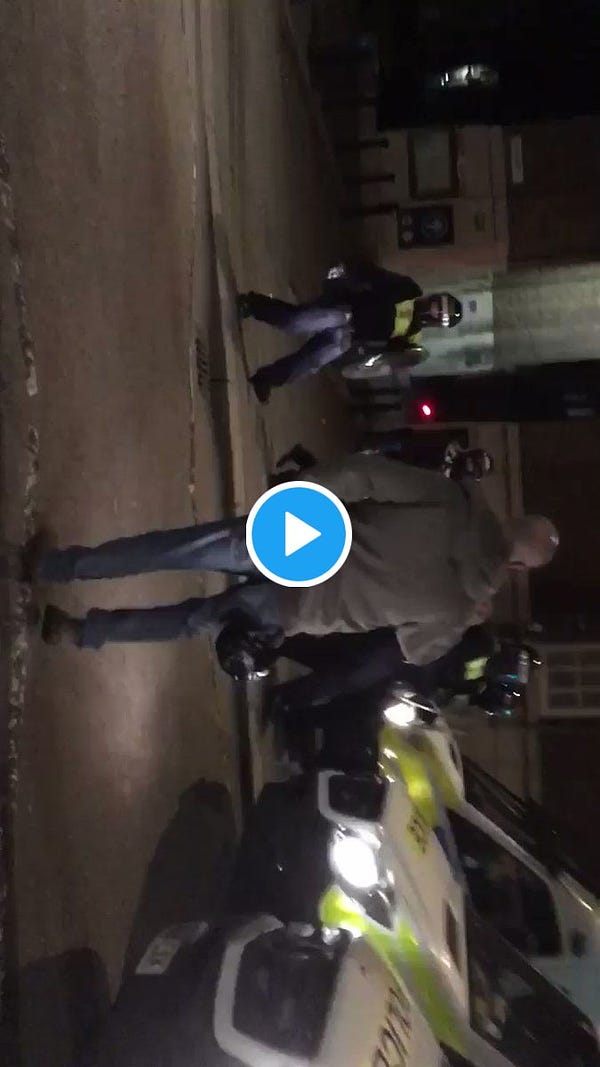
The incident began with an officer approaching and manhandling the pair:
Police officer: “You’ve been told to disperse, the next thing that happens is force gets used against you or you get arrested. Let’s get gone…”
Journalist: “We’re journalists and we’re covering your actions…”
Police officer: “No, you’re not.”
After stepping back into the line with his colleagues, the police officer continues:
You have been advised to disperse, force may be used against you, it doesn’t matter if you claim to be journalists because you’re studying journalism.
That may be a line we hear a lot more once the Policing bill passes: “It doesn’t matter if you claim to be journalists…” We saw similar scenes in the US during protests last year with members of the press being teargassed, beaten, and arrested by officers during militarised police actions.
There is already a clear distinction made by the police between hacks they recognise (those from newspapers that will print their press releases and statements largely unchanged) and those that they won’t (any independent media organisation regardless of accreditation or output).

Let’s take a look at how The Daily Telegraph is reporting on the events in Bristol last night: In a piece written by the paper’s Crime Correspondent, Martin Evans, and report Lizzie Roberts, under the headline Bristol protest: Police arrest 14 at latest 'Kill the Bill' demonstration, there is just one source quoted on what happened yesterday — the police. Evans and Roberts write:
Fourteen people have been arrested as police forcibly dispersed demonstrators in Bristol just two days after another demonstration that descended into rioting in the city.
Specially trained public order officers were deployed on Tuesday night to College Green, where police said around 130 people had gathered earlier in the evening.
Avon and Somerset Police tweeted at about 2.30am that the protest had concluded with the arrests of 14 people, including one connected with the riot on Sunday.
"It’s disappointing we needed to take this action on a day we remember those who’ve lost their lives," it said, referring to the anniversary of the first national lockdown.
It was the latest "Kill the Bill" protest in the city against the Government's Police, Crime, Sentencing and Courts Bill, which will see the police handed new powers to tackle demonstrations.
Avon and Somerset Police said officers had attempted to engage with demonstrators and asked them to move on.
The phrase “specially trained officers” is a telltale sign that the Telegraph pair have simply polished up the lines given to the paper by Avon & Somerset Police. As is the uncontested assertion that “officers had attempted to engage demonstrators and asked them to move on”. But the really shitty cherry on top is the heavily spun quote about the protest occurring “on a day we remember those who’ve lost their lives”. That’s pure editorialising from the police.

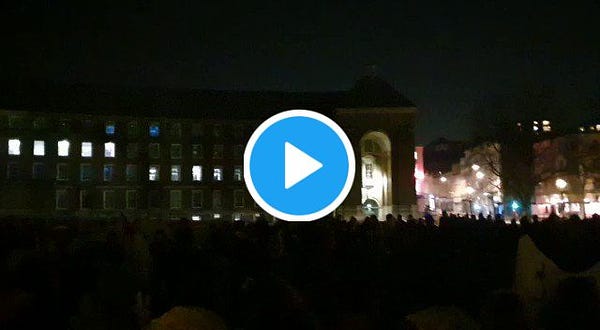
Despite Andrew Plant’s deleted tweet, the BBC News story on the events again only references the police’s perspective. It does opt for a more neutral headline than The Daily Telegraph version — Kill the Bill Bristol protests: Police action at demo — but again the specific reason for the protest is obscured.
The Sun’s reporting is predictably seen through the prism of police statements and ratchets up the drama. Under the headline RALLY RAGE ‘Kill the Bill’ protest: Cops clash with activists in Bristol AGAIN just 2 days after officers attacked in riot rampage, Mark Hodge and Liam Coleman write:
RIOT cops clashed with "Kill the Bill" protesters in Bristol for a second time in three days.
Baton-wielding officers broke up hundreds of people and arrested 14 activists who gathered in the city last night.
… and, again unsurprisingly, that tabloid-baiting quote from the police is given lots of space:
Cops slammed activists for gathering on the anniversary of the first Covid lockdown.
A force spokesman tweeted: "It's disappointing we needed to take this action on a day we remember those who've lost their lives."
Witnesses said a group of around 200 people had been singing and playing music since around 4pm.
However, unlike BBC News and The Daily Telegraph, whose reports contained no quotes from protestors during last night’s events, The Sun speaks to someone who was present, albeit deep into the story:
One protestor told The Sun that cops were "heavy-handed" and that the demonstrations were peaceful.
They said: “They came in from out of nowhere we were just sitting together singing and making peace signs and they bombarded us.
“It’s outrageous, they were heavy-handed.
"One girl was thrown in the air by the officers, you would have thought after what happened the other night they would have learnt their lesson.
“We just wanted a peaceful protest tonight and this is out of order. We weren’t causing any trouble.”
The outbreak of even-handedness doesn’t last long however and the article is soon back on track with further quotes from police statements. The language of “clashes” ensures that the reader is left with the erroneous impression that, despite the police engaging the demonstrators with horses, dogs, and batons, it was a battle and not a beating.
As I wrote in yesterday’s newsletter about Jo Coburn berating Nadia Whittome on the BBC’s Politics Live, the British press almost always reports police actions from the perspective that officers are honourable and telling the truth. For stories on police malfeasance and corruption, we have to wait years, by which point most perpetrators are too old, too retired, or too important to face justice.
Just yesterday, as the police response to the weekend’s protests, were being accepted at face value, 14 members of Shrewsbury 24 — who were targeted for participating in a national builders strike — finally had their wrongful convictions for unlawful assembly, conspiracy to intimidate and affray quashed. Several members of the group died before they could be exonerated.
Before the trials in 1973 and 1974, police destroyed witness statements — something the accused were not made aware of at the time — and documents, since revealed by the Shrewsbury 24 campaign, showed that the Information Research Department, a government agency set up in 1948 to wage a propaganda war against communism, was heavily involved in targeting the men.
The IRD gave a dossier on left-wing trade unionists to the makers of an ITV programme Red under the Bed. The documentary was broadcast during the prosecution of six of the Shrewsbury 24. Declassified documents also revealed that a Whitehall official congratulated the IRD on their work supplying the dossier to the programmed makers. The head of the IRD at the time, Thomas Baker, said it “had a discreet but considerable hand in [the] programme.”
Knowing about cases like the Shrewsbury 24 and the Special Demonstrations Squad which allowed undercover officers to have sex with and father children with unsuspecting women, why are we expected to simply take police claims at face value? Because that’s just how things are done. Because the line is that “the police are there to protect us” and that must be chanted like a mantra.
That people of colour, GRT communities, LGBT+ people, people who grew up in Northern Ireland and many others had and continue to have a very different experience of police ‘protection’ doesn’t matter because theirs are not the dominant voices in the British press. The tedious white Dulux paint swatch of middle class, middlebrow columnists have ‘never had any trouble with the police’ and if you have, well, you probably brought it on yourself…




